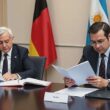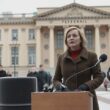The Alternative for Germany (AfD) continues to command a significant lead in public opinion, securing 26% of voter favor according to a new Forsa poll. This marks another week where the AfD outpaces the traditionally dominant Christian Democratic Union (CDU), which remains tethered at 24%. The gap underscores a persistent shift in the German political landscape, prompting renewed scrutiny of the CDU’s strategy and ability to regain lost ground. The Social Democrats (SPD), Greens and the Left party trail significantly, each garnering around 13% and 12% respectively, further isolating them from the burgeoning support for the far-right AfD.
A concerning 23% of those surveyed identify as undecided or non-voters, a figure indicative of widespread political disengagement or a lack of compelling options. This substantial pool represents a critical battleground for all parties, but particularly for the CDU aiming to reclaim its position.
Bundeskanzler Friedrich Merz’s approval rating continues its precipitous decline, the latest poll revealing a mere 25% satisfaction rate – a new low. A staggering 71% of respondents expressed dissatisfaction with his performance, fueling speculation about his leadership and the broader confidence in the current government. The findings highlight a growing disconnect between the Chancellor’s agenda and the anxieties of the German populace.
Adding to the prevailing sense of unease, economic expectations remain bleak. A majority – 62% – anticipate a deterioration in economic conditions, contrasting sharply with the 18% who foresee improvements. While this represents a marginal uptick from previous weeks, the overall sentiment remains firmly negative, indicating a lack of confidence in the government’s economic policies and a growing apprehension about the future.
Key concerns for German citizens are overwhelmingly centered on geopolitical instability. The conflict in Ukraine (36%) and developments in the Middle East (36%) dominate the public’s anxieties, followed closely by the performance of the federal government (29%) and the general economic situation (25%). These converging factors expose the challenges facing the government as it attempts to navigate both international crises and domestic discontent. The poll, conducted between October 7th and 13th, 2025, surveyed 2,500 participants, providing a snapshot of a nation grappling with uncertainty and questioning the direction of its leadership.





